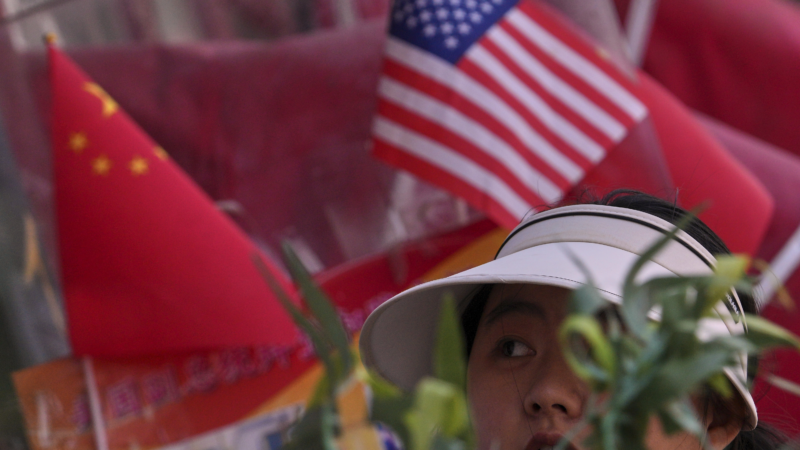The U.S. and China announce a deal to cut tariffs, temporarily easing trade war
GENEVA — The U.S. and China have agreed to significantly reduce tariffs imposed just weeks before on each other’s goods, after negotiators from both countries met over the weekend for trade talks in Switzerland, adding yet another dramatic turn in a dispute that has roiled financial markets and rocked the global economy in recent weeks.
American levies on Chinese goods will drop from at least 145% to a base levy of 30% for an initial period of 90 days, while Chinese levies are set to fall from at least 125% to 10% on American goods.
The talks were led on the Chinese side by Vice Premier He Lifeng and on the U.S. side by Trade Representative Jamieson Greer and Treasury Secretary Scott Bessent.
“We concluded that we have shared interest and we both have an interest in balanced trade,” Bessent said at a press conference on Monday. Greer also said there was a “positive path forward” on the two countries working to address fentanyl smuggling.
The new American tariff levels reflect a base 10% tariff that remains on all imports in addition to a total 20% tariff president Trump imposed earlier this year to punish Beijing for what the U.S. says is fentanyl-related chemicals being made in China.
“China has always pursuing win-win outcomes in its trade and economic negotiations, and therefore any possible deal to be reached will definitely by in the development interest of China’s own,” said Li Chenggang, a diplomat with China’s commerce ministry.
The delegations praised each other after the negotiations.
Vice Premier He described the atmosphere of the meeting as “candid, in-depth, and constructive” at a press conference following the meeting, saying it achieved “substantial progress and reached important consensus”.
The Chinese “came to deal this week,” said Greer, citing rapid progress between the two countries, which have also agreed to establish a consultation mechanism to continue addressing trade issues going forward.
“Neither side wants a decoupling,” said Bessent “We do want trade, we want more balanced trade, and I think both sides are committed to achieving that.”
The previous eye-watering tariff rates, which ratcheted up throughout April with retaliatory tariffs on both sides, had effectively paralyzed trade between the world’s two largest economies and shocked consumers and small businesses in the U.S. who suddenly saw their orders in China more than double in price. While welcome by importers, the tariff drops are temporary and could be pulled if talks between the two countries sour.
“While the Chamber is encouraged by the decision, uncertainty remains,” said Jens Eskelund, president of the European Union Chamber of Commerce in China. “Businesses need predictability to maintain normal operations and make investment decisions.”
The U.S. says it is now negotiating for China to purchase more American goods, a throwback to a trade deal the Trump administration negotiated with China during another trade war in 2020. However, China ended up purchasing none of the additional $200 billion in goods that the U.S. said they would.
Future talks will take place in China, the U.S., or a third country, according to a joint statement from the two sides.
“Are we going to rebalance the fundamental nature of the global economy in which China is a massive manufacturing hub and the US is a consumption economy? No, I don’t think so,” said Dmitry Grozoubinski, executive director of Geneva Trade Platform and a former Australian diplomat and trade negotiator. “But is there things the two sides can do for one another that would make both sides happy, at least a little bit? Sure, there absolutely must be.”
Aowen Cao contributed from Beijing.
Mideast clashes breach Olympic truce as athletes gather for Winter Paralympic Games
Fighting intensified in the Middle East during the Olympic truce, in effect through March 15. Flights are being disrupted as athletes and families converge on Italy for the Winter Paralympics.
A U.S. scholarship thrills a teacher in India. Then came the soul-crushing questions
She was thrilled to become the first teacher from a government-sponsored school in India to get a Fulbright exchange award to learn from U.S. schools. People asked two questions that clouded her joy.
Sunday Puzzle: Sandwiched
NPR's Ayesha Rascoe plays the puzzle with WXXI listener Jonathan Black and Weekend Edition Puzzlemaster Will Shortz.
U.S.-Israeli strikes in Iran continue into 2nd day, as the region faces turmoil
Israel said on Sunday it had launched more attacks on Iran, while the Iranian government continued strikes on Israel and on U.S. targets in Gulf states, Iraq and Jordan.
Trump warns Iran not to retaliate after Ayatollah Ali Khamenei is killed
The Iranian government has announced 40 days of mourning. The country's supreme leader was killed following an attack launched by the U.S. and Israel on Saturday against Iran.
Iran fires missiles at Israel and Gulf states after U.S.-Israeli strike kills Khamenei
Iran fired missiles at targets in Israel and Gulf Arab states Sunday after vowing massive retaliation for the killing of Supreme Leader Ayatollah Ali Khamenei by the United States and Israel.








